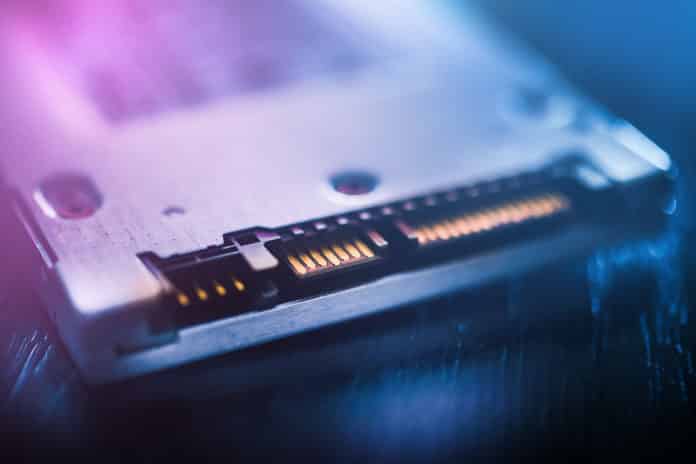Serial ATA solid state drives, or SATA SSDs, are a staple in the storage industry. They hold data for important applications as well as archive storage, and improve the performance of personal computers, servers, and arrays. Storage professionals choose SATA drives for their reliability and versatility — most arrays and computer systems still support SATA while not supporting all newer SSD protocols.
Our selections for best SATA drives offer some of the best speeds in their category, as well as additional features:
- Samsung 870 EVO: Best overall drive
- Crucial MX500: Best budget drive
- Samsung 870 QVO: Best for critical business environments
- SanDisk SSD Plus: Best price for non-critical workloads
- Samsung 860 EVO: Best high-end drive
- Western Digital Blue SATA: Best general use drive
- Key Features of SATA SSDs
- How to Choose the Best SATA SSD
- Frequently Asked Questions (FAQs)
- Methodology
- Bottom Line: The Best SATA SSDs
Top SATA SSDs Comparison
The following table compares the top SATA SSDs in drive capacity, read and write speeds, such additional features as encryption and cloning software, and price.
| Available Capacities | Read / Write Speed | Additional Features | Pricing | |
| Samsung 870 EVO | 250 GB, 500 GB, 1 TB, 2 TB, 4 TB | 560 / 530 MB/s |
|
|
| Crucial MX500 | 250 GB, 500 GB, 1 TB, 2 TB, 4 TB | 560 / 510 MB/s |
|
|
| Samsung 870 QVO | 1 TB, 2 TB, 4 TB, 8 TB | 560 / 530 MB/s |
|
|
| SanDisk SSD Plus | 240 GB, 480 GB, 960 GB, 1 TB, 2 TB | 545 / 450 MB/s | Shock resistance |
|
| Samsung 860 EVO | 250 GB, 500 GB, 1 TB, 2 TB, 4 TB | 550 / 520 MB/s |
|
|
| Western Digital Blue SATA | 2 TB, 4 TB | 560 / 530 MB/s |
|
|
Samsung 870 EVO
Best overall SSD
Samsung’s 870 EVO SATA is one of the most popular SSDs on the market, boasting up to 4 TB capacity and some of the highest SATA speeds. It has a five-year limited warranty and access to benchmark and drive health check software. The 870 EVO has undergone compatibility testing for both Synology and QNAP devices, so consider this drive for your NAS environments.
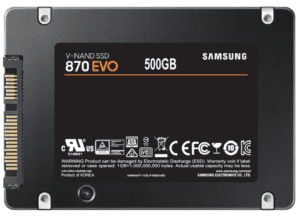
Pricing
- 250 GB — $34.99
- 500 GB — $49.99
- 1 TB — $89.99
- 2 TB — $149.99
- 4 TB — $299.99
Features
- Samsung Magician software offers benchmarking and health check capabilities
- Five-year limited warranty
Pros
- High speeds
- High capacity drives available
Cons
- More expensive than some similar drives
For more information, read the full [product] review.
Crucial MX500
Best for budgets
While plenty of SSDs are inexpensive, the Crucial MX500 is one of the best quality drives for its cost. It offers up to 4 TB capacity, high speeds, and power loss immunity capability. Additionally, the MX500 provides parity through Redundant Array of Independent NAND, a feature similar to RAID that helps protect the drive’s data. Consider the MX500 for business needs that require both high speeds and low prices.
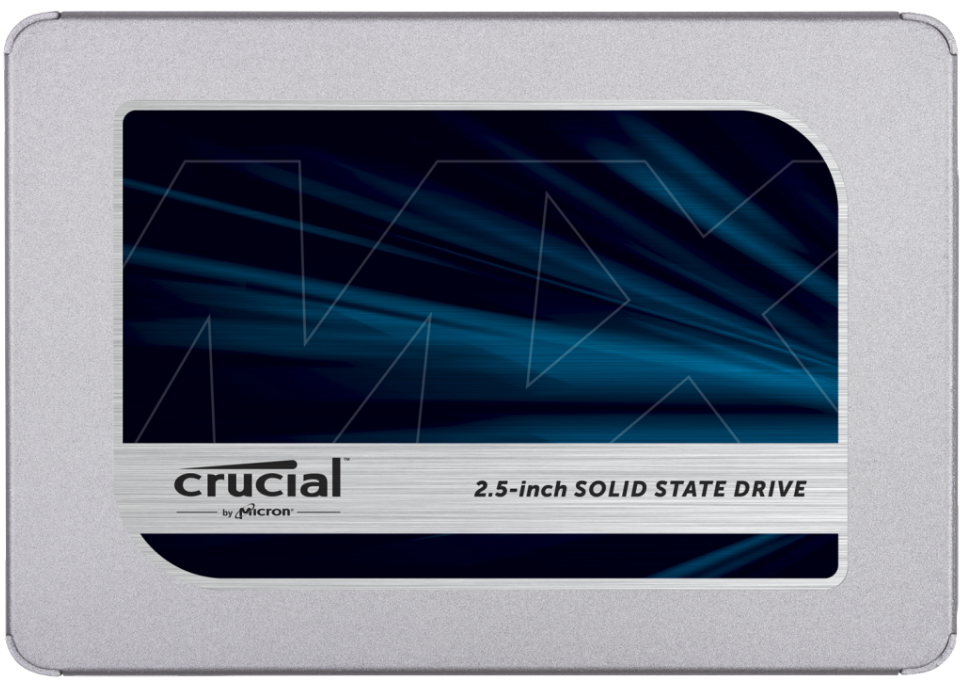
Pricing
- 250 GB — $29.99
- 500 GB — $39.99
- 1 TB — $59.99
- 2 TB — $119.99
- 4 TB —$ 279.99
Features
- Power loss immunity
- AES 256-bit encryption
- Error correction to help prevent data corruption
Pros
- Up to 4 TB capacity
- Inexpensive
Cons
- May not be supported in as many environments because Crucial is not as popular as Samsung or WD
Samsung 870 QVO
Best for enterprise environments
The Samsung 870 QVO offers some of the highest speeds in the market, and includes Samsung’s signature Magician software and drive health features. The QVO also has an 8 TB drive, a good choice for businesses looking for significant storage capacity. And while it’s more expensive than the Crucial MX500, it’s comparable in price to the Samsung 870 EVO and more affordable than the 860 EVO. Because of its high capacity and high speeds, the QVO is one of the most suitable SATA drives for supporting enterprise applications.
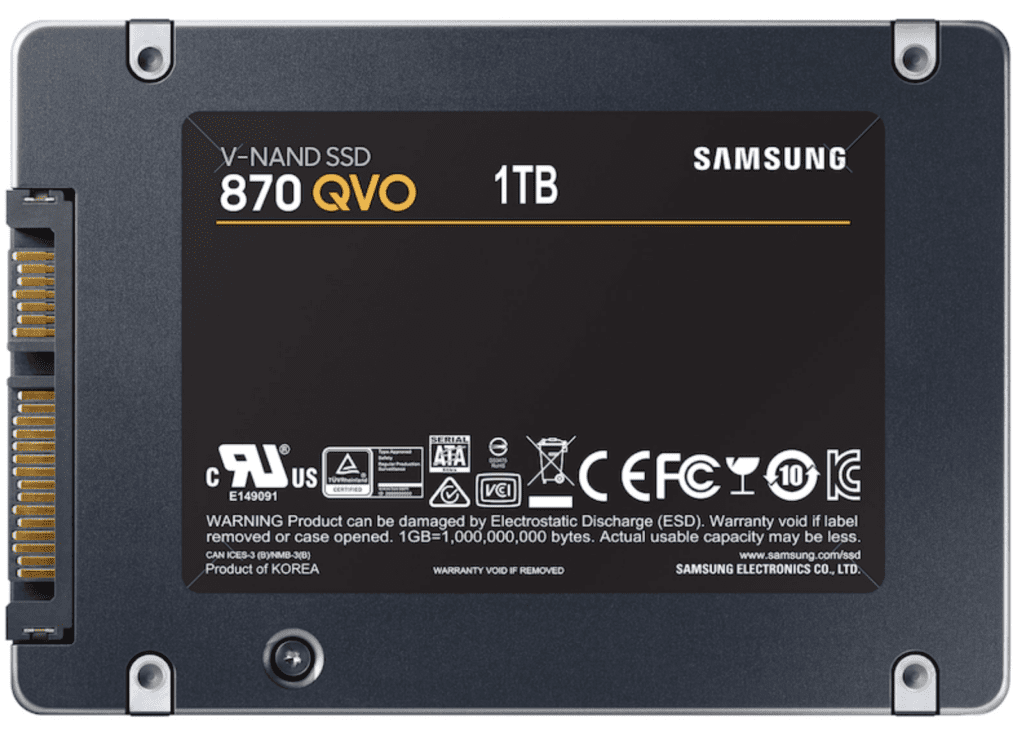
Pricing
- 1 TB — $89.99
- 2 TB — $139.99
- 4 TB — $279.99
- 8 TB —$499.99
Features
- Option to encrypt SSD
- Samsung Magician software
- 3-year limited warranty
Pros
- Up to 8 TB capacity
Cons
- No options less than 1 TB
SanDisk SSD Plus
Best price for non-critical workloads
The SanDisk SSD Plus is another budget drive for businesses to consider. Its 2 TB option tops out at $99.99, a good option for storage teams that need to buy drives in bulk. While it doesn’t have many excess features, it does come with cloning software and offers shock resistance capabilities. For your business’s non-critical workloads, the SanDisk is one of the most cost-effective drives on the market.
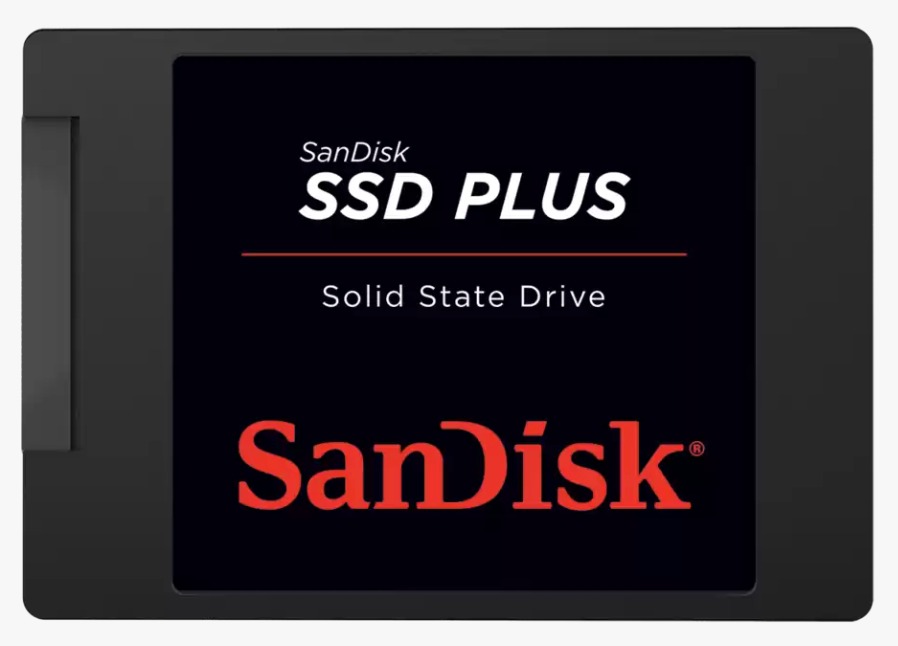
Pricing
- 240 GB — $22.99
- 480 GB — $29.99
- 960 GB — $59.99
- 1 TB — $49.99
- 2 TB — $99.99
Features
- Cloning software
- Shock resistance
- 3-year limited warranty
Pros
- One of the most affordable drives for the quality
Cons
- 2 TB is the highest capacity offered
Samsung 860 EVO
Best high-end drive
Samsung doesn’t stop at just one or two top-notch drives. The 860 EVO is another well-made SATA drive, offering a five-year limited warranty and up to 4 TB capacity just like the 870 EVO. Note that the 860 is a more expensive drive, however. It’s a strong choice for businesses that want a high-end drive, but if you need a cheaper option, it may not be the best fit. Like the other Samsung drives on this list, the 860 EVO also offers encryption support and drive management software.
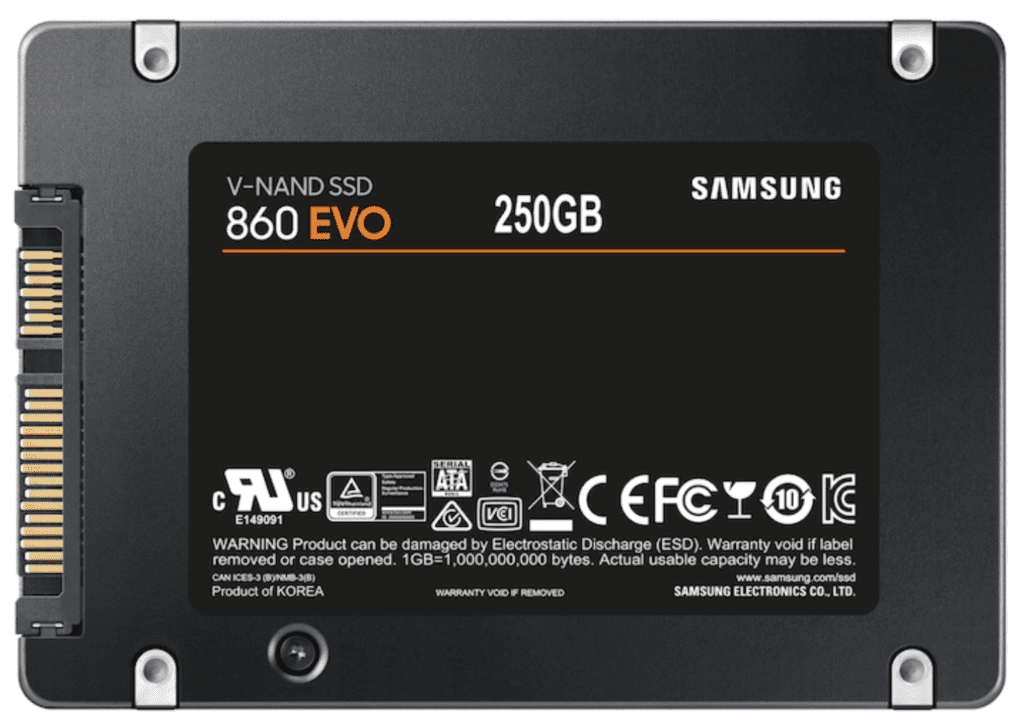
Pricing
- 250 GB — $49.99
- 500 GB — $89.99
- 1 TB — $149.99
- 2 TB — $279.99
- 4 TB — $549.99
Features
- Samsung Magician software
- Support for AES 256-bit encryption
- 5-year limited warranty
Pros
- Up to 4 TB capacity
Cons
- Very expensive
Western Digital Blue SATA
Best general use drive
The Western Digital Blue SATA, part of WD’s Blue family, boasts top SATA speeds and up to 4 TB capacity. It offers free cloning software — Western Digital’s edition of Acronis True Image — to back up data and clone drives. The Blue SATA has a five-year limited warranty and an SSD dashboard to monitor temperatures and operating system performance. The drive doesn’t offer any capacities lower than 2 and 4 TB, but for teams that need significant storage space, consider the WD Blue SATA.
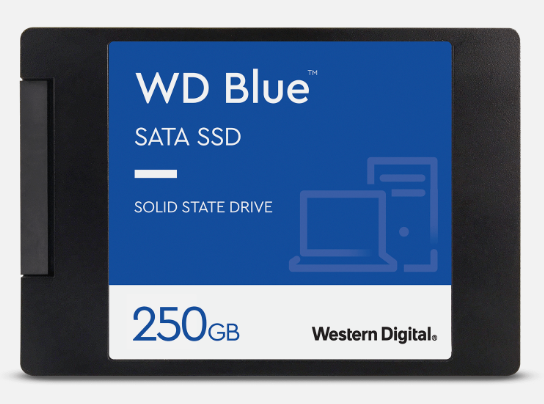
Pricing
- 2 TB — $112.99
- 4 TB — $224.99
Key Features
- Management software
- Acronis True Image cloning software
- 5-year limited warranty
Pros
- Top speeds
- Up to 4 TB capacity
Cons
- No smaller drives available
Key Features of SATA SSDs
Speed
While not as fast as NVMe SSDs, the best SATA drives on the market have much higher speeds than hard disk drives and can provide much better performance.
Capacity
Many business drives need high capacities to support data-intensive applications. Top SATA SSDS offer up to 8 TB of storage space.
Additional capabilities
Some drives offer features like encryption, free cloning software, and performance checks. These tools are particularly beneficial for SSDs that support critical workloads and sensitive data.
How to Choose the Best SATA SSD for Your Business
When buying SSDs for your business, consider the following questions.
What drive is most cost-effective?
Consider how many drives your business needs to buy and the number of computer systems you need to support before purchasing. The number of drives affects bulk cost. However, if you need a powerful, full-featured drive for just a few machines, it may be better to spend money on a more expensive drive.
Should you buy multiple drives?
As mentioned above, a particular SSD is rarely a one-size-fits-all. Don’t be afraid to consider multiple drives for different systems in your organization. For personal computers, you might want a cheaper SSD, but for a flash array supporting your sales team’s CRM, you may choose heavier-duty drives.
What additional features do you need?
If security is a high priority, you might want to choose a drive with encryption capabilities. Consider whether you need health check features. Additionally, consider the applications that the SSD will be supporting and their needs. Critical workloads might require a drive with benchmarking capabilities so you know if the SSD’s performance is suitable for that application.
Frequently Asked Questions (FAQs)
People often ask the following questions about SATA SSDs and the storage market?
Are SATA SSDs outdated?
This question arises because NVMe solid state drives are much faster than SATA drives — sometimes over ten times faster — and have grown in popularity, especially as their prices decrease. However, keep in mind that some machines still don’t support NVMe-based drives. SATA is still much more widely used and in some cases still cheaper. The best SATA SSDs are suitable for multiple business use cases and are not yet outdated.
Does M.2 support both SATA and NVMe?
M.2 is a drive form factor, not an interface. While you’ll most commonly see M.2 form factors with NVMe capability, there are some SATA drives with an M.2 form factor, like the Western Digital Blue SA510. Such a drive would require a computer motherboard to have an M.2 slot that supports SATA, which not all do.
Read more about M.2 and SATA.
What are the disadvantages of SATA?
SATA drives are much slower than NVMe drives. While they are widely supported by many computer systems, not all of them are suitable for some of a business’s most critical applications. One of the main advantages of NVMe-based drives is their threading capabilities, which allows multiple operations to run at the same time. SATA doesn’t have that ability, so its performance is significantly slower overall.
Read more about the speeds of NVMe-based drives versus other SSDs.
Methodology
We analyzed eight of the most popular SATA SSDs in the storage market, ranking drives based on speed, capacity, cost, and additional features. The rubric we used rated the drives on a scale from 0 to 5. From this list, we chose the six top-ranked drives and analyzed their suitability for different business use cases.
Bottom Line: The Best SATA SSDs
SATA solid state drives are a storage staple for many businesses. They’re supported by many computer systems, and the highest quality ones help teams store their data and support their applications. Before buying solid state drives for your organization, consider which features your business needs and which ones the SSD offers.
Is your business considering an NVMe SSD? Read about the best NVMe-based drives next.


